| If the Earth suffers when people have either too little or too
much, the questions arise: How
much is enough? What level of
consumption can the planet support? When do more things cease to add appreciably to human life? |
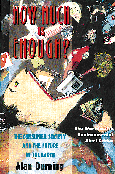 |
In the new order where connectivity is everything, success flows primarily from understanding networks which have their own rules. In New Rules, Kevin Kelly presents 10 fundamental principles that invert the traditional wisdom of the industrial world. |
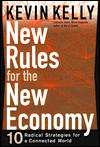 |
|
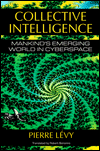 |
Pierre Levy describes a model of the emergence of a collective intelligence through the technology of cyberspace, exploring metaphysical and utopian issues related to the impact of computers on society and culture. The model draws on 10th- century Islamic mysticism. |
 |
This is science fiction without the fiction--and more mind-bending than anything you ever saw on Star Trek. Moravec, a professor of robotics at Carnegie Mellon University, envisions a not-too-distant future in which robots of superhuman intelligence have picked up the evolutionary baton from their human creators and headed out into space to colonize the universe. | |
| Astronomer John Barrow takes an intriguing look at the limits of science in a book which weaves together a fascinating tapestry of ideas and illuminates some of the most profound questions of science--from the possibility of time travel to the very structure of the universe. |
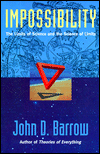 |
In this classic work, John Barrow and Frank Tipler examine the question
of mankind's
place in the Universe, taking the reader on a tour of many scientific
disciplines and offering fascinating insights into
issues such as the nature of life, the search for extraterrestrial intelligence, and the history and fate of our universe. |
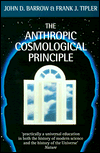 |
|
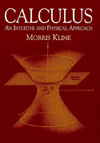 |
This classic text presents an intuitive and science-related introduction to calculus. The focus is on geometrical, physical, and heuristic arguments and generalizations from concrete cases, offering convincing justifications of theorems and techniques. | . |
Bioinvasion--the
spread of alien, "exotic" organisms--is gnawing away at ecosystems all
over the world, largely unnoticed and
unopposed. The continuing increase in travel and trade around the globe is fostering the spread of more and more invaders of almost every conceivable description. |
|
| Concepts like Omega Point Theory and the noosphere started with the phenomenal man who wrote the Phenomenon of Man. Well before his time, Teilhard de Chardin still inspires and educates over 50 years after his death. |
 |
Jini enables any device - from enterprise servers to kitchen appliances
- to network smoothly, simply, and reliably. Core
Jini delivers a comprehensive, practical explanation
of Jini technology, plus Java code experienced developers need to start building solutions. |
 |
|
 |
Nicholas Negroponte's (M.I.T., Wired) view of what it means to "Be Digital," Being Digital is a collection of 18 of his most popular Wired articles. |
 |
Beyond Calculation polls the cream of computer science, asking each to speculate on what's around the next 50 years of the exponential curve. | |
| A computer in your shoe? Maybe so. Neil Gershenfeld, director of MIT's
Media Lab, joins the ranks of techno-prognosticators with When
Things Start to Think, and his focus is on how the future of
computing will fit into our physical realities |
 |
Abraham Maslow was one of the pioneers of the human potential movement. Religion, Values and Peak Experiences is a classic for anyone believing in belief. |
 |
|
 |
In this thoroughly rewritten edition of his classic work, "The While Hole in Time," Russell powerfully demonstrates the need for a spiritual renaissance in the face of the dangers of ever accelerating change. This is an extraordinary vision for the new millennium, one that integrates the evolving nature of civilization with humanity's timeless quest for harmony and inner peace. |  |
We are in the midst of the most dramatic cultural shift in three hundred years. This book explains why great change is simmering in all facets of our civilization, from economics to science and spirituality. Our inherited concept of a machine world, the clockwork universe, is giving way and the vision of a web world is rising to take its place. | |
|
|
||||